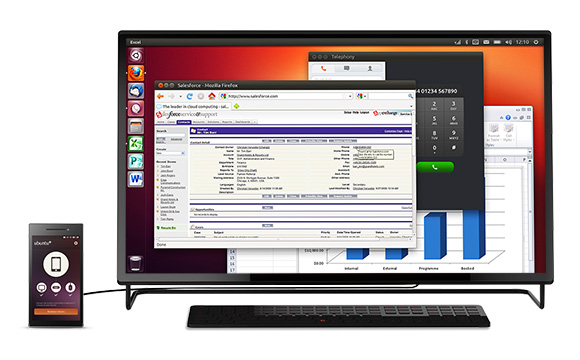FOSS Week in Review Obama disarms Samsung An already unlevel playing field just became more tilted as far as patents are concerned. We are shaking…
Posts tagged as “ubuntu”
Back on June 23, when we asked you to name the first Linux distro you ever used, we pretty much knew that the choice “Other” would take the day.
That’s because we wanted to be completely neutral, so the ten choices we offered besides “Other” were just the top ten distros from the Distrowatch “Page Hit Ranking,” which meant that those who started their Linux life with something other than Debian or SUSE in the pre-Ubuntu era were not represented.
If you want to see desktop Linux finally get some traction with the unwashed public, Mark Shuttleworth is more likely to be the guy who’ll make that happen than anyone who’s come along so far. He’s a capitalist and for better or worse this is a capitalist world. He knows that nothing big is going to get done on this market oriented planet without the art of the deal and some hustle. He also understands something about fit and finish, which was always lacking in desktop Linux until he came along.
For too long, we’ve been sitting around wringing our hands, sometimes proclaiming this to finally be the year of the Linux desktop without doing anything to make it happen and sometimes bemoaning the fact that the world still hasn’t discovered Linux as the secret to computing happiness. The thing is, the world never knows anything about secrets until they’re not secret anymore. We’ve been wanting Linux to just “catch on,” while we’ve been blaming the OEMs for not automatically pushing our home grown geek-centric distros with the same elan they put behind their bread and butter Windows.
Christine Hall has been a journalist since 1971. In 2001, she began writing a weekly consumer computer column and started covering Linux and FOSS in 2002 after making the switch to GNU/Linux. Follow her on Twitter: @BrideOfLinux
It’s beginning to look as if the naysayers are right about Mark Shuttleworth’s hopes to raise $32 million to produce about 40,000 Ubuntu Edge devices. It ain’t going to happen, unless he manages to pull another rabbit out of the hat. Right now, his Indiegogo campaign is stalled at a little over $7 million, where it’s been for several days.
I’m not going to go into the details that led to this, we’ve covered that already, but it’s beginning to look like the Ubuntu Edge happy train is running out of steam, especially since about half of the money raised came in the first day or two of a campaign that’s now in day nine.
Christine Hall has been a journalist since 1971. In 2001, she began writing a weekly consumer computer column and started covering Linux and FOSS in 2002 after making the switch to GNU/Linux. Follow her on Twitter: @BrideOfLinux
FOSS Week in Review
Ubuntu Edge–computing on the go-go
Probably the biggest news in all of tech this week, not just the FOSS world, came with Canonical’s announcement on Monday of the Ubuntu Edge. In case you’ve been away camping somewhere all week, the Edge is a hybrid device that can function both as a high end smartphone, running either Android or Ubuntu Touch, or it can be hooked up to a monitor, keyboard and mouse to work as a conventional PC running Ubuntu Linux.
That news alone would be dumbfounding enough, but as the pitchman on TV always says, “Wait! There’s more…”
The results have been tallied and Debian got the most votes in our Community Distro Poll. We would call them the “winner,” but this wasn’t about winners and losers. It was about trying to reach a consensus on what we mean by the term “community distro.” We asked, “Which GNU/Linux distros do you consider to be legitimate community distros?” Choices weren’t limited to one; voters could choose as many as they wanted and even add more through a text box supplied by choosing “Other.”
The polls are closed. The votes have been counted. CentOS hands down wins our Web Server OS poll.
About six weeks ago we offered-up a list of six GNU/Linux distros and asked which you’d choose for your web server if you were limited to the distros on that list. The list was composed of what we’ve found to be the most frequently offered Linux OS choices by web hosting companies for their virtual private server (VPS) or dedicated server customers. We offered each of the six in both their 32 bit and 64 bit implementations, which is also usually the case with web hosting companies.
 Missing from the list were two distros that are almost exclusively associated with server environments, Red Hat and SUSE Linux Enterprise. They were not included in our list because they’re rarely offered without additional cost by hosting companies because they’re not freely available to download and install.
Missing from the list were two distros that are almost exclusively associated with server environments, Red Hat and SUSE Linux Enterprise. They were not included in our list because they’re rarely offered without additional cost by hosting companies because they’re not freely available to download and install.
It will probably come as no surprise to anyone that Microsoft topped the list in our “Who Don’t You Trust” poll. That’s the poll, launched on May 27th and closed on June 20th, in which we asked the question, “What tech company would you least trust to manage a FOSS project?” 411 people took the poll, which might be characterized by it’s lack of surprising results. In fact, we have to go to nearly the bottom of the list to find some small surprises.
I’m a sucker for every kind of “Top Five” (or Top 10 or Top 20) list there is. I love reading them and I enjoy…
According to our “Newbie” Distro Poll, someone considering moving from Windows or Mac to Linux should consider taking Linux Mint for a spin. The poll asked the question, “What Linux distro would you be most likely to recommend to a new Linux user?” Evidently this was a subject that interested many of you, because a whopping 1,339 votes were cast in this poll, making it the most number of votes one of our polls has ever received.







